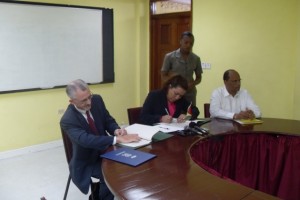The United States has officially signed on with the government here to provide tailored assistance to deportees returning to Guyana as part of a pilot project to support their reintegration into the society.

The US$3M ($615M) project has budgeted for some 250 returnees here, but funds have also been earmarked for a similar regional programme in The Bahamas. The US had previously implemented the project in Haiti.
Minister of Home Affairs Clement Rohee said yesterday that deportees can expect tangible support from government now that an agreement has been inked with the United States to contribute to the long-term reintegration of returnees into the society.
The cooperation agreement was signed with the International Organization for Migration (IOM) paving the way for the US to implement programmes here in various areas including capacity building, advisory services and technical cooperation on migration issues beginning sometime in July or early August.
An IOM office is expected to be set up here to assist deportees with specific training and also connecting them with employers here.
“In general the focus is on jobs, providing productive employment for someone [returnees] is one of the critical factors for successful reintegration”, Dr. Richard Scott said yesterday. Dr. Scott is the IOM representative for North America and the Caribbean.
He said that the US is eager to start the project and that it is looking forward to collaborating with Guyana on this, “critical programme”.
The project provides for a new direction as it relates to how deportees are treated, placing key focus on the attention paid to deportees when they enter the country, and aiming to offer critical initial support. Among the project objectives is assisting the government in establishing a permanent intake reception centre for deportees, which will serve as temporary residential facilities, as well as providing them with adequate social and financial assistance.
Rohee’s ministry is the focal point for the project. He said yesterday that the project has been long sought here and at the regional level, noting that while it has the potential of mitigating some of the social impacts of deportation, there is still a need for Guyana and the US to work more closely on immigration and security issues, “in a manner respectful of national laws and government services capacity while being sensitive to the effects of human displacement”.
He stated that the project augurs well for crime control and citizen security, noting that criminal deportees is a top issue here and in the region. Rohee said that Guyana and the US had earlier signed a Memorandum of Understand-ing providing for a procedural framework for the return of criminal aliens from the US.
According to him, the MOU addresses issues pertaining to travel documents for deportees and also lists the procedures for making requests for travel documents for criminal aliens. He noted that the need for greater collaboration between the Caribbean and the US “to properly integrate persons deported into the region” was highlighted at the recently concluded Fifth Summit of the Americas in Trinidad.
The Home Affairs Minister stressed that deportations from the US are up, noting that some 197,000 persons were deported worldwide last year, and that the figure is expected to grow by ten percent in 2009 given the current pace of deportations.
Rohee said that some 2939 Guyanese nationals convicted for criminal offences in countries abroad were deported during the period 1996-2007 at an average of 245 criminal deportees a year. He added that this figure excluded persons deported for immigration offences. During that same period 1528 criminal deportees were returned from the US, at an average of 127 persons per year.
Further, he said that the deviant behaviour of most deportees is a product of the environment in which they have resided and that those countries therefore have the moral responsibility for their rehabilitation. He said too that many deportees are without relatives here, and that they face severe difficulties reintegrating into the society.
Rohee continued that they become a social burden on the state as well as prime targets for recruitment by organized criminal gangs. He added that many deportees here have no roots in the country or have been ostracized by relatives. “It is therefore incumbent on the government to find appropriate living facilities for deportees and provide them with basic needs while working to reintegrate them into the society”, he said.
Foreign Affairs Minister, Carolyn Rodrigues-Birkett signed the agreement on behalf of the government. She briefly remarked that the project will contribute to the long term reintegration of returnees from the US into the society by equipping them to become productive members of society.
She said that IOM teams had visited and held talks with the Home Affairs Ministry and the Ministry of Human Services and Social Security.
A local NGO, the Juncata Juvant Friendly Society, which uses the preferred term of ‘involuntary remigrants’ has been working to remove the stigma attached to these persons and hopes to educate society on the real issues facing them. (Iana Seales)